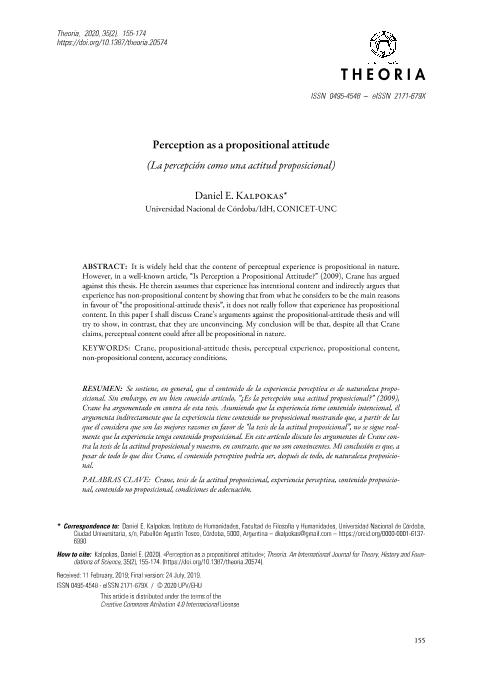Artículo
Se sostiene, en general, que el contenido de la experiencia perceptiva es de naturaleza proposicional. Sin embargo, en un bien conocido artículo, “¿Es la percepción una actitud proposicional?” (2009), Crane ha argumentado en contra de esta tesis. Asumiendo que la experiencia tiene contenido intencional, él argumenta indirectamente que la experiencia tiene contenido no proposicional mostrando que, a partir de las que él considera que son las mejores razones en favor de “la tesis de la actitud proposicional”, no se sigue realmente que la experiencia tenga contenido proposicional. En este artículo discuto los argumentos de Crane contra la tesis de la actitud proposicional y muestro, en contraste, que no son convincentes. Mi conclusión es que, a pesar de todo lo que dice Crane, el contenido perceptivo podría ser, después de todo, de naturaleza proposicional. It is widely held that the content of perceptual experience is propositional in nature. However, in a well-known article, “Is Perception a Propositional Attitude?” (2009), Crane has argued against this thesis. He therein assumes that experience has intentional content and indirectly argues that experience has non-propositional content by showing that from what he considers to be the main reasons in favour of “the propositional-attitude thesis”, it does not really follow that experience has propositional content. In this paper I shall discuss Crane’s arguments against the propositional-attitude thesis and will try to show, in contrast, that they are unconvincing. My conclusion will be that, despite all that Crane claims, perceptual content could after all be propositional in nature.
Perception as a Propositional Attitude
Título:
La percepción como una actitud proposicional
Fecha de publicación:
05/2020
Editorial:
Universidad del País Vasco
Revista:
Theoria
ISSN:
0495-4548
e-ISSN:
2171-679X
Idioma:
Inglés
Tipo de recurso:
Artículo publicado
Clasificación temática:
Resumen
Archivos asociados
Licencia
Identificadores
Colecciones
Articulos(IDH)
Articulos de INSTITUTO DE HUMANIDADES
Articulos de INSTITUTO DE HUMANIDADES
Citación
Kalpokas, Daniel Enrique; Perception as a Propositional Attitude; Universidad del País Vasco; Theoria; 35; 2; 5-2020; 155-174
Compartir
Altmétricas




